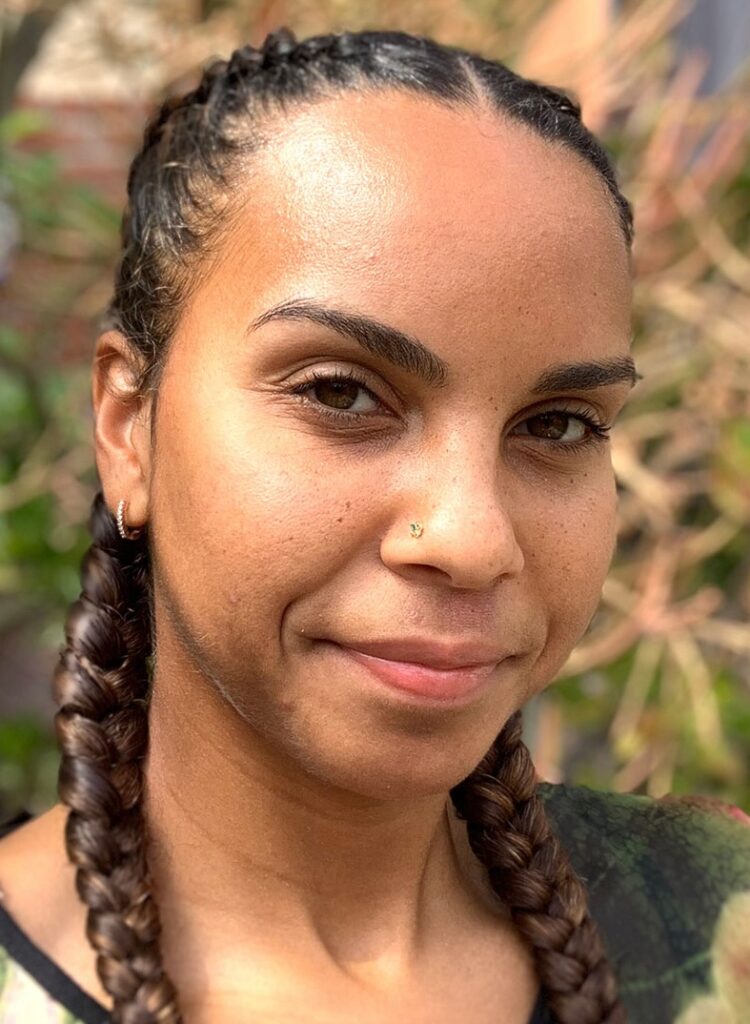Fourth-year ND student’s NUNM Discovery Day talk promotes healthcare equity as a critical tool to avoid environmental harm.
With NUNM Discovery Day: “Climate Change Health Risks Revealed” set for October 26, the National University of Natural Medicine is featuring event speakers who will discuss the links between climate change and health.

Eden Jeffries began her academic career at the National University of Natural Medicine (NUNM) with social justice firmly in mind.
Jeffries, a fourth-year student in the Doctor of Naturopathic Medicine program, said her intellectual curiosity now lives at the intersection of sociology and medicine
While Jeffries, a native of Los Angeles, said she always seemed to have a humanitarian streak to her, she also witnessed the effects of inequity from an early age.
Growing up in a predominately Black community but educated in largely white, well-resourced environments, Jeffries noticed how certain degrees of privilege created disparities between racial and ethnic groups.
“I was always emotionally provoked by narratives of oppression and human suffering,” Jeffries said, “which got me curious about the systemic and institutional factors that contributed to these outcomes.”
During her undergraduate coursework at New York University, Jefrries focused on arts, community activism and social justice, working as a K-12 academic tutor and caretaker along the way to help youth develop strategies that would improve their performance, motivation and confidence.
Jeffries would later remember this experience helping to shape her decision to study medicine and attend NUNM where she could study healthcare from a whole-person approach.
Building resilience, cultivating healing, and optimizing livelihood were at the core of effective social change. At NUNM, she said she could provide more equitable and competent care for diverse populations to embody trust and safety along their journey.
Working within a biopsychosocial framework to explore how various settings affect overall patient wellness, such as where someone was raised, she said she discovered the intrinsic link between individual health and environment. This caused her to look at changes to the broader environment, such as trends in overall poorer air quality, and how they could further damage health.
This convinced her that climate change was not simply an environmental challenge, but a social justice issue in need of solutions, she said.
Jeffries discussed her upcoming talk about the impact environmental factors can have on the most vulnerable populations and how tackling social justice in healthcare can lead to better outcomes for both individuals and the planet:
NUNM: How did the topic of lab testing for environmental health effects become important to you?
Jeffries: We are hearing more and more about the burdens of environmental change on our health, and it’s become clear the degree of toxic exposure and toxic load is unavoidable. This can feel really disempowering, create collective anxiety, and lead to suffering for those dealing with complex health concerns that seemingly have no clear causation or diagnosis.
Lab testing is a pathway to more directed solutions that can support our detoxing capacity. Environmental medicine is not a widely available competency in the conventional medical setting, and so the more public awareness that exists around how we can creatively utilize available testing, the more empowered patients can feel to advocate for their concerns.
How is the natural medicine community in a unique position to address issues related to climate change?
Environmental medicine is not something most healthcare practitioners get trained in. We are in a unique position to become informed about the state of our environment and examine situations where environmental risk, exposure, and disease may be present. We can then use our foundational biomedical brain and clinical toolset to actually identify associations between health conditions and toxicity and propose solutions for building resilience.
Increased ecological disruption and poor health outcomes create this cycle or feedback loop in which they reinforce each other. As providers who are working to improve internal health—through better nutrition, lifestyle changes, and reducing reliance on harmful substances—this cycle can be disrupted. This can create communities empowered to enact more mindful, sustainable, and responsible environmental practices that can in turn be more mindful and protective of ecosystems and resources.
Why do you feel it’s important for both the NUNM community and broader public to attend this event?
The impact of climate change—pollution, extreme weather events, and resource scarcity—has repeatedly demonstrated that this is not just an environmental issue, but a social justice crisis. Again, we have an opportunity that most trained clinicians don’t and develop competency in environmental health. We get trained in modalities that are effective treatment options, although oftentimes not widely accessible. We can serve at the forefront of advocacy and reform in this area, and likewise, others will be looking to us for our alternative perspective and innovative wisdom for direction as we move forward.
What do you hope attendees can take away from this event?
The environmental changes and challenges we face today are inextricably linked to systemic factors of colonization, capitalism, racism, and environmental degradation. When I consider the disproportionate prevalence of chronic disease in low-income and marginalized populations, it has brought to light how social determinants of health are deeply tied to environmental conditions.
I hope this event can garner interest from prospective students and prospective patients by providing insight into the benefits naturopathic medicine, Chinese medicine, and holistic nutrition has to offer to both individuals, as well as others working within the broader field of healthcare.
Written by Ashley Villarreal, Marketing Content Specialist